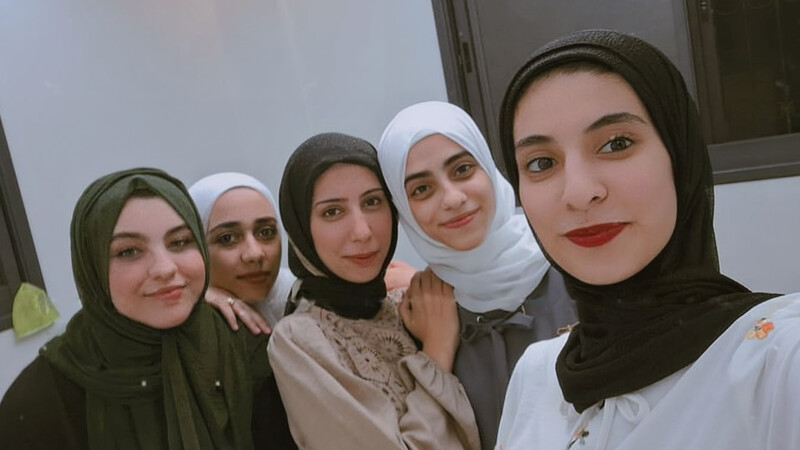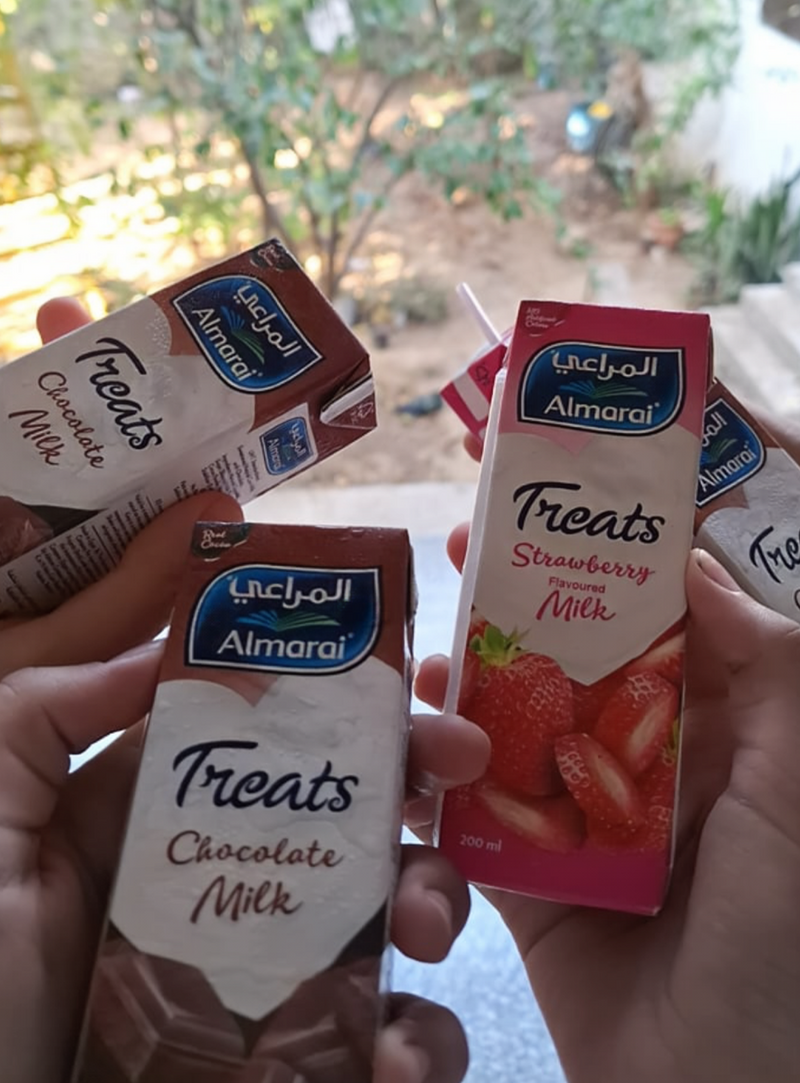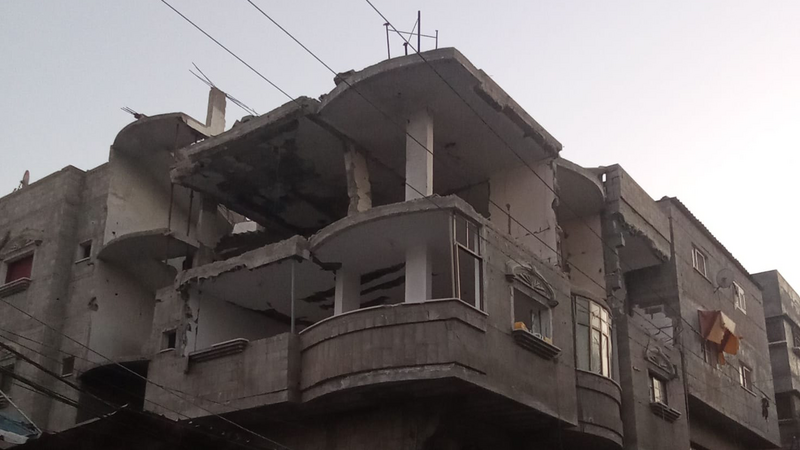The Electronic Intifada 13 May 2025

The last gathering of the group of friends, from left: Ruaa, Shireen, the author, Tuqa and Alaa.
In 2018, while in middle school at Nuseirat refugee camp, I saw Ruaa and Tuqa from my classroom window running out of their classes.
I told our friend Alaa, and we snuck out of our class as well to join Ruaa and Tuqa in the yard at the back of the school.
The small yard was filled with cypress and pine trees on the sides and sand in the middle.
Ruaa, Tuqa, Alaa and I sat in the corner by the wall of our school and drew a heart with the infinity sign inside. Our initials circled the heart as a symbol of our forever friendship.
We didn’t live in the same neighborhood in Nuseirat, but we grew up together. We would often gather at each other’s homes or go to the market after school to browse accessories.
Ruaa, Tuqa, Alaa and I would buy matching bracelets with the word “Forever” printed on them.
After three years, as we moved on to high school, Tuqa, Alaa and I attended the same school while Ruaa went to a nearby school – separated from ours only by a back gate.
At 6 am, Ruaa and Tuqa would come first and wait for me and Alaa to walk together to school.
We would meet at the start of al-Ishreen Street – a long road lined with farmland, trees, a few shops and buildings, with our schools situated in the middle.
During the school break, Tuqa, Alaa and I would sneak through the back gate to see Ruaa, whose school went on break at the same time as ours.
We would hug her but then make her buy us food as a playful punishment for making us walk there.
Close confidant

Drinks enjoyed during the meeting in Alaa’s garden.
Ruaa and I developed a close friendship, often visiting each other and going out together. Our families and friends knew how intimate our bond was.
Every week, we would buy falafel sandwiches from the shop next to Ruaa’s house and head to Salah al-Din Street.
Ruaa and I would walk and talk, sharing our thoughts, secrets and dreams.
We would pause to pick flowers from a jasmine vine along the roadside.
“Life is already exhausting. I just want to live in peace – that’s enough for me,” Ruaa would say during our high school years.
When high school ended, so did our meetups for a while as we started attending different universities.
A month passed without us seeing each other, but we weren’t going to let university drift us apart.
We couldn’t wait to see each other again.
Alaa’s cousin, Shireen – who lived in Beach refugee camp but started to spend more time with us, especially during summer holidays – arranged a gathering so we all could see each other again.
Ruaa preferred to meet at Alaa’s house to sit in their garden, surrounded by grapevines, olive and fig trees and roses. So that’s where we met on 28 August 2023.
Ruaa, Tuqa, Alaa and Shireen chatted about how they had all chosen majors related to technology while I was the only one who had gone into the arts.
But we laughed about how, despite that, they still come to me with their tech problems.
We reminisced about how – back in school – Ruaa, Tuqa, Alaa and I wore matching jackets and the “Forever” bracelets. It felt so special to us back then, but our older selves couldn’t help but laugh about it and cringe.
They all also laughed when I finished my food before they had the chance to take photos and post them on Instagram.
We caught up on everything and kept laughing that day.
WhatsApp lifeline
When the Israeli genocide started in October 2023, Ruaa, Alaa, Tuqa, Shireen and I checked on each other through our WhatsApp group after every explosion.
We would stay up all night comforting one another by saying that this nightmare would end soon.
On 29 December 2023, the Israeli army bombed our area in Nuseirat.
I woke up at around 1 am to the sound of an explosion next to our house, which cut off the internet.
Then came another blast. I couldn’t tell where it hit.
I tried checking on my friends, but my attempts failed as there was no internet connection.
My sleep that night was fitful. Nightmares chased me.
I had a deep fear that something terrible might have happened to one of my friends.
I climbed to the attic, hoping to catch the slightest signal.
After hours of trying, only one message arrived. It was from my cousin: “My condolences.”
I felt the world had stopped.
I didn’t know who I had lost. I stayed in the attic – even though being there was dangerous – crying and hoping what was going through my mind was more of a nightmare.
My family was packing to evacuate to Rafah, but I couldn’t join them before checking on my friends. I kept trying to catch a signal.
At around 8 am, dozens of messages came all at once – but none from Ruaa.
I rushed to ask on our WhatsApp group: “Please tell me nothing happened to Ruaa?”
“I wish I could say no,” Alaa replied.
I didn’t cry, nor did I believe the news.
My family had finished packing and were waiting for me in the car.
I got into the car – numb and unable to grasp what was happening.
We stayed at my aunt’s house in Rafah, where I was in shock and did not engage in conversation for a month. I only sent a text message each week to check in on Tuqa, Alaa and Shireen.
I then slowly began engaging in conversation, mentioning Ruaa’s name in every one.
Reality
At the end of January 2024, my family and I returned to our home in Nuseirat.
I went and stood before the rubble of Ruaa’s bombed house.
I looked at every stone, wondering where she was sitting when the missile struck.
Ruaa’s room was completely destroyed as the missile hit it and exploded inside.
I started to imagine the moment the missile struck Ruaa’s room – and I couldn’t stop thinking about how she died.
The reality hit me then – Ruaa had really died. She died here.

Ruaa’s bombed-out home.
The world felt tight, and I started crying bitterly. I tried to stop the tears but couldn’t.
I went to see Tuqa – since her house was next to Ruaa’s – and I knew she would understand my sorrow. I hugged Tuqa very tightly.
Tuqa and I sat in silence for a while.
“How did she die?” I asked, unable to hold the question any longer.
Tuqa and I broke down in tears – the question was too heavy.
“When the strike hit, the heavy smoke made it hard to see anything, and rubble was scattered everywhere,” Tuqa recounted.
“People in the street started shouting ‘the Al-Hoor house!’” Tuqa added, referring to Ruaa’s family name.
“My father went out to check, only to return after five minutes. He hugged me and said, ‘God have mercy on her, sweetheart.’”
The hardest part was hearing from Tuqa where they found Ruaa’s body – thrown onto the roof of the falafel shop where she and I would buy sandwiches before starting our weekly walk.
Ruaa’s last gift
Ruaa came to me in a dream on 15 December 2024 – the night of my birthday and just days before her death anniversary.
In the dream, Tuqa, Alaa, Shireen and I were sitting in a quiet restaurant filled with flowers.
Ruaa arrived – she was silent, just smiling and watching us.
We ran to and hugged her. Then she came and sat with us in the restaurant.
Tuqa, Alaa, Shireen and I talked. But Ruaa just smiled and then got up to leave.
We begged her with tears not to leave.
Ruaa told us: “I’m really happy. I missed you so much and I’m glad I saw you. Please be happy.”
Then she left.
As I woke up from this dream, I felt that this was the best gift I could ever receive from Ruaa – seeing her smiling and feeling her embrace again.
It felt like a message: Ruaa is at peace as she had always wished.
And we should be, too.
Now Ruaa is woven into our meetups. We scroll through photos of her – and of us together – and recall our moments with her.
We imagine what she would do if she were with us:
“She would laugh at this.”
“She would tell us to do this.”
“She would be happy we did this.”
We even created an Instagram account to keep posting duaa for Ruaa’s soul and to make sure her memory will be forever green.
Ruaa should never be a painful memory. She wouldn’t want to see tears every time we speak of her.
She would want us to remember her with love and laughter – to tell the world how radiant her smile was and how her heart overflowed with kindness and peace.
Dear Ruaa, we know you are in a better place, but everything feels so empty without you.
We will never forget you and will keep speaking and writing about you.
We will keep missing you.
And we will forever love you.
All images courtesy of the author.
Hala Al-Khatib is a writer and poet from the Gaza Strip.


